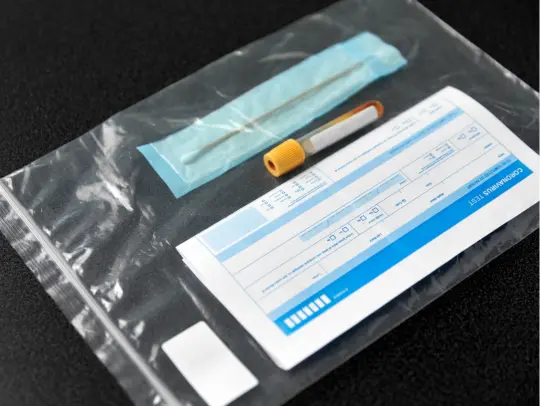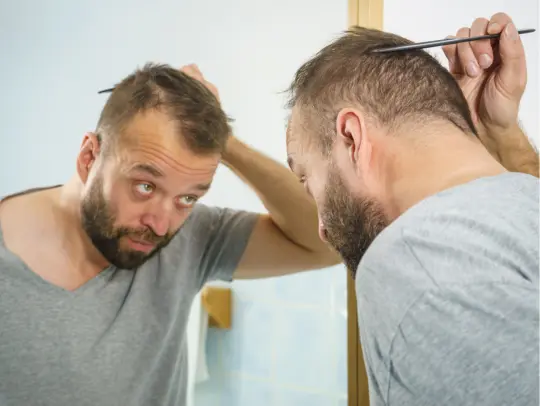
Viagra Frequently Asked Questions
Q: What’s organic erectile dysfunction? Is it the same as physiological ED, and does it respond to treatment with Viagra?
A: Organic ED is the same as physiological ED and refers to an inability to have an erection that's hard enough for penetration because you're not pumping enough blood to your penis to facilitate erection. Organic is the single most significant cause of ED and, fortunately, can sometimes be reversed if you adopt a healthier lifestyle.
However, if the problem is already too advanced to fix, you can get the extra help you need from Viagra, which temporarily optimizes blood flow to the penis. However, even though you're taking Viagra to improve blood flow to the penis, you should continue taking every step to live a healthier lifestyle.
Such proactive measures could, in time, reduce your need for outside erectile help and improve your overall cardiovascular health, reducing your risk of heart attack and stroke.
Q: While traveling in Italy, my girlfriend and I stopped in at a gelato shop. I saw one flavor of the gelato identified as Viagra gelato. Does it contain the same active ingredient as Viagra?
A: It would be nice to get the erection-friendly effects of Viagra for the cost of an ice cream cone, but sadly the gelato you saw in Italy contains none of the little blue pill active ingredients. However, it does match the iconic deep-blue hue of the Viagra tablet. An article posted at Delish.com says that some of the Viagra gelato sold in shops throughout Italy contains herbal ingredients that have effects similar to Viagra, but none contain sildenafil citrate.
Those who have tried Viagra gelato from different shops across Italy say that the deep-blue gelato taste varies from shop to shop. In some places, it tastes like bubble gum or black licorice, while in others, it tastes similar to that of cotton candy (does cotton candy even have a preference?).
Back in 2014, award-winning U.K. food inventor Charlie Harry Francis created a batch of Viagra-infused ice cream for a wealthy client. Each scoop of the ice cream reportedly contained 25 milligrams of sildenafil citrate, and Francis dubbed his Viagra ice cream "Arousal."
Q: How long does it take for Viagra to take effect?
A: The little blue pill usually takes effect 30 to 60 minutes after you pop it. For most users, the average time before the onset of effects is 30 minutes, although some may find they have to wait a bit longer for Viagra's effects to kick in. For some men, Viagra's effects last for up to five hours, but the average duration of effect is more like three to four hours.
The recommended starting dose for Viagra is a 50-milligram tablet, which works for most men. However, if the 50-milligram tablet doesn't get done, you can increase your amount to 100 milligrams. In the unlikely event that the 50-milligram tablet is more than you need, you can lower your quantity to 25 milligrams to see if that works for you.
Q: Pfizer is a major international pharmaceutical manufacturer with offices and factories worldwide. But I was surprised when I heard that the company produces most of the world's Viagra in a factory in Ireland. Is that true?
A: Headquartered in New York City, Pfizer Inc. is a global corporation with offices and manufacturing facilities scattered around the world. For several years, Pfizer's plant at Ringaskiddy in Ireland's County Cork has turned out the bulk of Viagra's active ingredient, sildenafil citrate. While Pfizer has lost its patent on the little blue pill in most major markets worldwide, its American patent will not expire until April 2020.
However, under special agreements that Pfizer negotiated with Teva Pharmaceutical and Mylan, those generic drugmakers won the right to begin marketing generic formulations of the medication in December 2017. Because Pfizer's U.S. patent runs until 2020, Teva and Mylan will be required to pay licensing fees to Pfizer until the latter's patent expires. With six locations and more than 3,000 employees across Ireland, Pfizer is a major employer in Ireland, where it has a capital investment of roughly $7 billion.
Q: I've been fortunate thus far to enjoy healthy erectile function, but I used Revatio for difficulty breathing in the past, diagnosed with pulmonary arterial hypertension. When I went to refill a prescription recently, I noticed that the generic substitute was labeled sildenafil citrate, which is the same active ingredient as that in Viagra. What gives?
A: In the two decades since Pfizer first introduced Viagra, the little blue pill's active ingredient, sildenafil citrate, has been found to have several other medicinal properties. One of the first discoveries is its ability to improve respiratory function in patients with pulmonary arterial hypertension. PAH is a medical condition where high blood pressure targets the arteries that supply the lungs and heart, making patients struggle to breathe normally.
In 2005, the FDA approved Pfizer's new drug application to market sildenafil citrate in 20-milligram tablets under Revatio. The sildenafil temporarily dilates the arteries supplying the lungs and heart, allowing near-normal blood flow and easing respiratory difficulties. Although Revatio was introduced seven years after Viagra, Pfizer's patent on the popular drug has already expired, opening the demand to generic competition.
Q: Is it possible to overdose on Viagra? And, if so, what would the symptoms of an overdose be?
A: The maximum recommended daily dose of Viagra is 100 milligrams, which some men need to get the desired results from the drug—taking more than that would constitute an overdose and would increase the likelihood and severity of the drug's known side effects. The most common side effects of Viagra are back pain, diarrhea, dizziness, flushing, headache, muscle aches, runny or stuffy nose, and upset stomach.
Because sildenafil citrate temporarily lowers blood pressure to dilate the arteries that supply the penis, thus increasing blood flow to the organ and facilitating erection, too much of the drug could cause a steep drop in blood pressure. In unique cases, the side effects could lead to extreme lightheadedness and even loss of consciousness.
In addition to amplifying the drug's common side effects, taking too much Viagra could cause chest pain, shortness of breath, and even an irregular heartbeat. A Viagra overdose could also increase your risk of experiencing one of sildenafil citrate's more severe side effects, which include a sudden decrease or loss of hearing or vision and an erection that lasts for four hours or more.
Although the latter might seem at first glance a potential benefit, priapism is no laughing matter. An erection that lasts more than four hours can cause permanent damage to erectile tissue, making it even harder or nearly impossible to get an erection in the future.
Q: I read somewhere that Viagra reduced the risk of a heart attack. Is that accurate, and could it help me too?
A: While earlier studies had already established Viagra's benefits for those with damaged hearts, a more recent study found that men with type 2 diabetes could reduce their chances of heart attack significantly by taking Viagra.
The study, conducted by researchers at England's University of Manchester, also found that people with type 2 diabetes taking Viagra were more likely to survive a heart attack than those not on the drug. The research team reviewed the electronic health records of nearly 6,000 male type 2 diabetics between the ages of 40 and 89.
As a treatment for ED, Viagra works by temporarily disabling an enzyme known as phosphodiesterase-5 that can interfere with optimal blood flow. It turns out that sildenafil citrate, the active ingredient in Viagra, also optimizes blood flow to the heart, thus reducing the chance of heart attack and increasing the survival odds for those with heart attacks.
Findings from the study, funded by the British Heart Foundation and the United Kingdom's National Institute of Health Research, were published in a 2016 issue of the BMJ journal "Heart."
Q: Is Viagra available in any other form than oral tablets? I remember reading about plans to produce it in spray form and as a transdermal patch. Are those reports accurate?
A: Over the years, reports have circulated that Pfizer scientists and others were considering offering alternative delivery methods for the ED drug. Such alternatives have included transdermal patches and nasal sprays. So far, these reports remain unconfirmed, and no such products have appeared on the market, nor have there been credible announcements that they were actually in the pipeline. A transdermal patch can deliver several medications, but how well this would suit Viagra is unclear.
Q: I've been using Viagra for the last 18 months, which has worked well for me. However, I'm wondering if there are foods or beverages that I can include in my diet to help the drug perform even more effectively. If so, what are these wonder foods?
A: Although it's doubtful that any food or beverage could perform as well as Viagra, certain nutrients are known to improve erectile function. Adding these to your diet would help to ensure that your erectile function stays strong and hopefully improves. In an article on EverydayHealth.com, Chris Iliades, M.D., lists several of these nutrients and the foods and beverages.
Foods high in nitrates help the body to create nitric oxide, which plays a key role in erectile function. Nitrate-rich foods include arugula, beets, celery, iceberg lettuce, and spinach.
For those with a sweet tooth, dark chocolate is a rich source of flavonoids that support robust vascular health. Pistachios are rich in arginine, an amino acid that relaxes blood vessels, thus improving blood flow. Oysters and certain other shellfish are high in Zinc, a mineral that helps to promote the body's production of testosterone.
At the same time, watermelon contains high citrulline levels, an amino acid that converts into arginine in the body. Tomatoes and pink grapefruit are rich sources of lycopene, a phytonutrient and a powerful antioxidant.
Q: I'm in college and have no problem getting an erection, but several friends told me about using Viagra recreationally. What's the point really, and what are the dangers of such use, if any?
A: Make no mistake: Men with varying degrees of erectile dysfunction were the target audience for Viagra and other oral ED medications. Doctors do not prescribe recreational use of Viagra, and this abuse can result in erectile dysfunction in the future. The negative effects of Viagra, some of which can be very significant, are unnecessarily exposed by recreational users.
Men unwise enough to use Viagra recreationally might also tend to experiment with poppers, which are nitrate-based recreational drugs. Taking the two together can trigger a potentially life-threatening drop in blood pressure. Becoming too dependent on the erectile support provided by Viagra can eventually erode a man's self-confidence and his ability to achieve an erection on his own.
Men who might use Viagra recreationally also might be the type to buy Viagra online from unsavory vendors who are more likely to supply counterfeit drugs than the real thing. And the downside of counterfeits goes way beyond spending money for a worthless drug because many of these counterfeit medicines contain toxic ingredients used as fillers and coloring agents.
Seizures of so-called herbal Viagra have sometimes found that the product contained varying amounts of sildenafil citrate, the drug's actual active ingredient. However, in some cases, the amount of sildenafil was too little to be effective, while in others, it was so high that it could pose a health risk.
Q: A year or two ago, I read an article about a study that found that Viagra could help to prevent or at least delay the onset of type 2 diabetes. Is that true?
A: A small-scale study at Vanderbilt University School of Medicine found promising evidence that sildenafil citrate, Viagra's active ingredient, can improve insulin sensitivity in both men and women diagnosed as prediabetics. The study by a research team under the direction of Nancy J. Brown, M.D., a professor of medicine and pharmacology, enlisted 42 prediabetic participants.
Half of the study participants took 25 milligrams of sildenafil citrate daily, while the other half got a placebo. After the three-month study period, those given sildenafil showed a 20 percent improvement in insulin sensitivity compared with those who got a placebo. Although further study remains, this study indicates that Viagra could delay the onset of type 2 diabetes or even prevent it altogether.
Q: I'm a mountain biker in Colorado, and I compete in mountain bike races at elevations ranging from 6,000 to 10,000 feet or more. I read somewhere that Viagra can improve athletic performance at higher altitudes. Would it be of any help to me?
A: Studies designed to determine Viagra's effects on athletic performance at sea level showed that cyclists taking the drug performed no better than those who did not take medicine. That same study also measured the effects of the drug on athletic performance at a simulated elevation of 12,700 feet, which is well above the maximum height at which you're cycling.
It found that some performed much better, up to 45 percent better at that altitude than others, but not all cyclists responded to the drug in the same positive way. Ten cyclists who took sildenafil citrate at that altitude lowered their time covering six kilometers by 15 percent compared to placebo trials at length," according to an article posted at ScienceDaily.com.
Overall, the cyclists who took sildenafil also improved stroke volume and output compared with those who took a placebo. However, the researchers found that the individual improvement for those shown sildenafil varied from little or none among some participants to significant gains by others.
This led them to conclude that sildenafil's benefits for athletic performance at high elevations vary from one cyclist to another, depending upon how well each responds to the drug's effects. Whether Viagra would improve your cycling performance at elevations lower than 12,700 feet is uncertain, but it probably wouldn't hurt to give it a try.
Q: For the last year or so, I've been having increasing problems getting and keeping an erection. I consulted my doctor to see about getting a prescription for Viagra, but he insisted that I first take something he called a nocturnal penile tumescence test or stamp test. A series of tests showed that I was still getting erections while sleeping and upon waking in the morning. The doctor said this proved that my erection problems were not physiological. Is that true, and wouldn't Viagra help anyway?
A: While Viagra might give you a temporary psychological boost that would allow you to achieve and keep an erection, it would stem largely from a phenomenon known as the placebo effect. You think it will help, and so it does, but only for a while. Your doctor has determined that there is no physiological issue, indicating that your erection problems are almost certainly of psychological origin.
Such difficulties can arise from performance anxiety, stress, depression, and relationship problems. Medication can sometimes clear up such issues, but those drugs can also interfere with normal erectile function. The key to overcoming ED of a psychological nature is identifying the underlying causes and then addressing them, usually achieved through psychological counseling.
Q: Is it true that erectile dysfunction can be an early warning of more serious cardiovascular health issues? What can I do to avoid such problems, and can I take Viagra in the meantime to help me function sexually?
A: Although erectile dysfunction is certainly no laughing matter, it is far less severe a health problem than a heart attack or stroke. And because the arteries that supply the penis are considerably smaller than those that supply oxygen-rich blood to the heart and brain, ED of vascular origin is viewed as an early warning of more severe health problems elsewhere in your body.
If you take the hint and modify your lifestyle to improve your cardiovascular health, you may be able to reverse the early symptoms of ED. And in doing so, you will also make it less likely that you will experience other cardiovascular health crises in the future.
Eating a heart-healthy diet and maintaining a regular physical activity regimen can go a long way toward maintaining overall cardiovascular health. You can also try to quit smoking, moderate alcohol consumption, and shed excess pounds. If erectile difficulties persist even though you've modified your lifestyle, Viagra could give you the erection boost you need.



































































































































